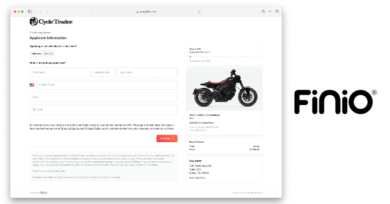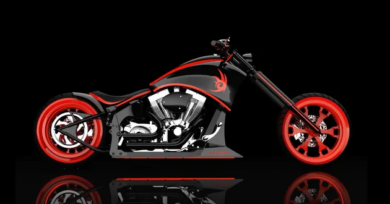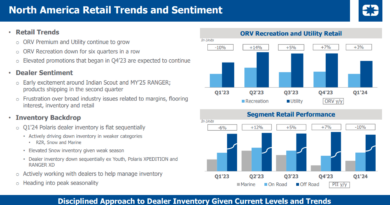Feb. 11, 2008 – Short Block Technologies expands offerings beyond engines
By Jeff Hemmel
PWC Editor
PWC engine remanufacturing kingpin Short Block Technologies (SBT) recently announced a price increase for its remanufactured two-stroke and four-stroke engines. The reason? “We like everyone else have suffered through the increases in cost of materials,” explained company president Cj Lammers. “Our labor force is very stable. There are a lot of benefits to stability, but it means also your costs rise. We’ve been trying to keep it away from the customer as long as we can, but this year with everything else increasing, we’ve finally had to take small steps to increase (our price).”
Lost in the announcement, however, was the fact that SBT has now quietly become far more than the largest remanufacturer of PWC engines worldwide. By now offering parts for literally every inch of the motor, pump and driveline, SBT is now vying to trump the OEMs as the source of replacement equipment not only for the end consumer, but for dealer service departments as well.
Beyond Engines
SBT founder Greg Pickren started with crankshafts, later reasoning that if the company could handle the most complex component of the engine it could handle entire engine remanufacturing. Today, SBT produces 10,000-12,000 engines a year in its Clearwater, Fla.. facility, offering a replacement for literally almost all two-stroke engines and many four-strokes. That latter number promises to expand with the recent addition of Kawasaki and Honda powerplants to the mix.
Engines and crankshafts, however, are just two components under the seat of a PWC. Recently, SBT has been looking at ways to continue the company’s heralded expansion.
“With our expertise in gearing and the mechanical side of the engines, we said, ‘Let’s look at the driveline, what can we replicate on the driveline that the average customer needs when their boats go down?’” said Lammers, a 15-year veteran of the Ford Motor Co. Now, this 40-year-old is at the helm while SBT answers that question by targeting those remaining driveline components. SBT now offers driveline and jet pump-rebuild kits, as well as manufactures impeller shafts, coupler shafts, driveshafts, entire jet pump housings, PTO couplers and wear rings.
“If it’s under your seat, we’ll have a part for it,” said Lammers. “It’s keeping to the area of our expertise — the PWC market — and now expanding it so that we’re now one-stop shopping.”
SBT has long had success by eliminating much of the middlemen in the distribution channel, sourcing parts directly from the manufacturer, and bypassing distributors or sales reps, all which add to the final price tag. As Lammers explains, however, market maturity also plays a role. The basic technology at SBT’s end of the market is not rapidly changing, meaning a company like SBT isn’t committed to carrying the same kind of overhead as a manufacturer trying to chase the latest and greatest technologies. SBT also works carefully with their suppliers to develop processes that cut the costs of actual production. Lammers says the end result is the ability to offer prices for the customer below the OEM level, while maintaining the same level of quality.
Quality Check
Those on the OEM side often question those claims. Lammers steadfastly defends the company’s reputation, however, explaining that a successful product is the result of careful quality control at every step of the production process.
“Basically with most of our suppliers, once you develop the relationships and you understand how each other works, most of those relationships last a long time,” he said. As to the new product, “it is a continuous challenge as we expand what we want to do — Delrin liners, that type of new materials stuff — of finding the right supplier with the quality. It’s not an overnight thing.
“Typically when we decide we want to do a part, it won’t be available until the next year. So it’s developing the part, saying what specs we want, having the suppliers propose the process they’re going to use and giving us sample parts, developing the overall specs so they’re tight enough for the PWC, yet good enough for easy production. We’ll go through several samplings.”
Once the product is finished and shipping, the company is relentless in its quality checks. SBT pulls a statistically significant number of parts from every shipment and thoroughly tests them, making sure the supplier is keeping up to the specified standards, and that there has been no change in production.
SBT also defends its decision to go overseas for much of its production. “The automotive industry, one of the biggest and most powerful industries in the world, actually spends a lot of time sourcing from China and other countries,” he said. “It’s all about getting the product right. If you’re not going to work together with your supplier on the quality, then you’ll probably have issues. If you try to rush it to market, then you’ll probably have issues. That’s why we do a very methodical process of getting together with the supplier to define exactly what performance we need, define what we’re looking for, having them do samples and going back and forth.
“Until we get it right we’ll go through several iterations. And we’re always keeping track of quality. Every shipment that comes in gets measured so that we see we don’t have variances in production. It’s just like being supplied from the shop right down the street, except we’re able to get it at a far better price.”
Dealer aware
SBT offers dealers discounted pricing on its entire line, offering the same “no questions asked” warranty that it offers the consumer on most of the large items.
“That’s how confident we are,” assured Lammers. “But to have that confidence and still stay in business, we spend a lot of time worrying about the quality and the design of each part.” Product that does come back is fully torn down and inspected. “We want to know why it fails, so we can make sure it was a failure due to the installation or use, not a failure from any component inside. Every engine that gets returned for warranty gets fully torn down and fully inspected to make sure our quality is there.”
Service after the sale also remains top priority. To that end, SBT offers toll-free tech support, as well as a variety of tech articles, illustrated instructions and forums on the Internet.
Where does Lammers see the company in five years? “Continuing to deliver all the customers needs for the PWC industry, be that under the seat or anywhere else,” he predicted. “We are intimately tied to the PWC market, and we want people to continue to have fun, to enjoy it and have a passion for it.”




